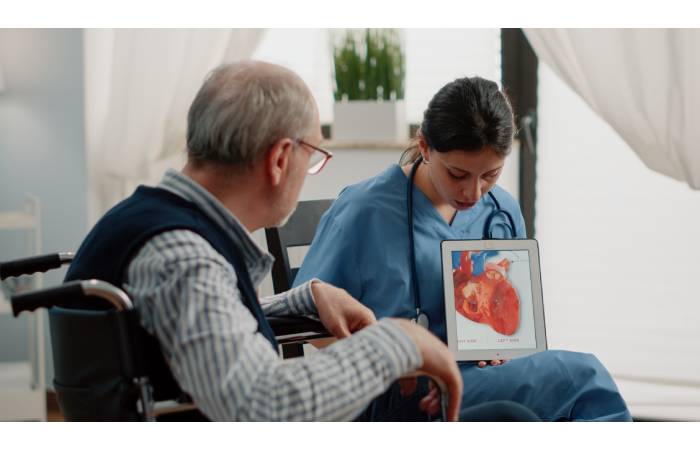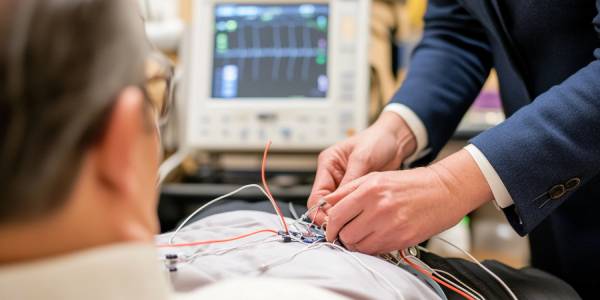For the aging population, cardiac health challenges are common, making the coronary angiogram an essential diagnostic tool. This test offers a clear view of heart arteries, which is vital for diagnosing and planning treatments for heart diseases. It is critical for elderly folks and their caregivers to grasp the test’s safety, effectiveness, and special considerations, paving the way for better care and potentially life-saving actions. Highlighting its role in patient care emphasizes the importance of informed choices and enhanced care for the elderly. As we delve into coronary angiograms in Chennai (https://www.drkarthigesanclinic.com/coronary-angiogram/), we connect medical technology with caring for elderly patients.
The Importance of Coronary Angiogram for Elderly
Grasping why coronary angiography is crucial, the elderly need an understanding of coronary heart disease (CHD) and its effects on this group. CHD’s prevalence among the elderly leads to serious issues like heart attacks and strokes.
However, opting for coronary angiography, especially for older patients, needs careful thought. While generally safe, it poses a higher complication risk for older people. Thus, balancing the benefits of precise diagnosis and improved life quality against these risks is vital. The study’s findings suggest that for many elderly patients, coronary angiography’s benefits in managing heart disease and preventing severe outcomes outweigh the potential risks.Click here to know more .
Assessing Coronary Angiograms Safety and Effectiveness for Elderly
Studies show that despite older patients facing a higher complication risk, the benefits, including a notable drop in adverse outcomes like death, heart attack, and stroke, make it a valuable diagnostic tool. Research involving elderly patients with chest pain or a history of heart attacks indicated a lower risk of these adverse outcomes for those who underwent the procedure compared to those who received conservative therapy. This highlights the importance of not withholding coronary angiography from older people, as it can lead to a better prognosis and survival.
Tips for Preparing for a Coronary Angiogram
This procedure, known for offering detailed heart artery images, needs careful preparation for safety and effectiveness. Patients should:
- Avoid eating or drinking for six to eight hours before the test to prevent complications.
- Discuss any medications, especially if taking blood thinners or diabetes treatments like Metformin or insulin.
- Share all medication and allergy information, especially about iodine or contrast dye.
- Complete preliminary tests, such as blood and electrocardiogram (ECG).
By adhering to these steps, patients and their caregivers contribute to a smoother experience and better outcomes.
During and After a Coronary Angiogram: What to Expect
Experiencing a coronary angiogram can be daunting for elderly patients. Yet, understanding what happens during and after the test can significantly reduce anxiety. This guide aims to clarify the procedure and recovery journey.
During the procedure:
- Local anesthesia is used.
- A catheter is placed through an artery in the wrist or groin.
- Contrast dye is injected through the catheter for X-ray images.
- The test usually lasts 30 to 60 minutes, depending on the case’s complexity.
After the test, patients should:
- Press on the insertion spot to stop bleeding.
- Drink plenty of fluids to help clear the contrast dye from their body.
- Watch the insertion spot for too much bleeding or infection signs.
- While many go home the same day, some may need overnight observation, especially if the catheter was placed through the groin.
Recovery at Home
- Rest at home for a few days.
- Avoid heavy lifting or intense exercise.
- Keep the wound clean and dry.
- Follow the healthcare provider’s advice on resuming activities (e.g., showering, driving).
- Seek medical help immediately if there are signs of complications: fever, increasing pain, swelling, or discharge.
Decoding Coronary Angiogram Results and Next Steps
Average angiogram results indicate unblocked coronary arteries, suggesting good heart blood supply. While reassuring, it is vital for patients to keep monitoring their heart health and maintain a heart-friendly lifestyle to avoid future problems. Abnormal results, showing blockages or narrowings, point to coronary artery disease (CAD) or other heart issues. These findings may lead to further tests, medication adjustments, or more invasive treatments like angioplasty or bypass surgery, depending on blockage severity and location.
Also Read : Advantages Of POCUS In Geriatrics
Addressing Risks and Complications of Coronary Angiogram
Risks vary from minor issues like bruising and allergic reactions to more severe ones like kidney function issues and vascular injury. To reduce these risks, patients must follow pre-procedure instructions closely and monitor the insertion spot for infection or excessive bleeding signs after the procedure. Talking openly with healthcare providers about any post-procedure symptoms or concerns is vital. While considering complications is necessary, reassuring patients and their caregivers about the benefits of coronary angiography in diagnosing and treating heart conditions is equally important.

Improving Elderly Heart Health with Informed Care Choices
For elderly individuals dealing with heart health issues, a coronary angiogram marks a significant step towards proactive care. This thorough exam not only illuminates the state of the heart’s arteries but also outlines the most effective treatment paths. Navigating healthcare, especially for older people, requires a partner who grasps these complex decisions. Connect with us to learn more about linking advanced diagnostic methods with the comprehensive care the elderly merit. Coronary Angiogram in Chennai is a key component of our commitment to providing the highest level of care.

